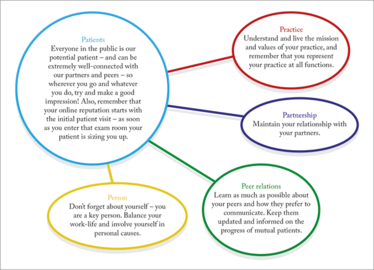
Taking Control
Managing your online reputation is key, but what about your offline reputation?
At a Glance
- More and more patients are turning to the internet to search for physicians to fulfill their health and eyecare needs
- In a highly competitive field, managing your online reputation is crucial, particularly in today’s era of social media
- The best way to do this is to take control of the information available online about you by maintaining a professional presence online
- I share my tips, and explain how managing your online reputation actually starts with your offline reputation
I used to be a very private person when it came to social media. But when I was studying for my MBA, this changed. My professors and classmates told me things like “If you are out of sight, you are out of mind,” and “People aren’t going to be thinking of you when it is time to be invited to a presentation or lecture – you need to have some presence and build some networks.” It was around this topic of networking, and its importance, that my interest in managing online reputation began. The first thing I did was join LinkedIn. I then joined Facebook briefly, before immediately shutting it off as I thought there was too much drama for what I wanted. But I then started to see the value of it, both professionally and personally. You have to control your professional reputation, because if you don’t control it, somebody else will.
The value of online reputation
Over the past several years I have had more and more patients tell me they found me online. And as patients increasingly turn to the internet to search for physicians, it is becoming key that you have a strong online persona – there is a lot of importance in branding yourself and your practice. To do this, you need to take control of your online reputation, so that when patients Google your name, you will be in control of at least part of the information that they see – and this will dilute anything negative that may be out there too.
Most people that I speak to about this say “I know I need to do it, I just don’t know how to get started.” This shouldn’t stop them. There’s plenty of help out there: in publications, in the friendly advice of other physicians, and in companies who are geared up to help with exactly this sort of thing. But whilst many see the value of online reputation, a frequent response I have heard is “I will never join social media.” And why is this? Because of the fear of negative comments. In my opinion, you should welcome all comments, as it is an opportunity to make things better. As an ophthalmologist, you have to be willing to expand your horizons and try to improve, even if you feel like you have something perfected. There is always room for improvement, even if it is just a little bit, so you should never shy away. Receiving negative feedback online also allows you to respond and potentially resolve any issues. Honestly evaluate and ask yourself “How am I doing?” It could be that maybe your wait times are too long, but acknowledging it, evaluating it, and sharing it with the public – as opposed to hiding it – means you’re only going to come out on top. If responding to negative feedback makes you uncomfortable, then you should wait until you feel more comfortable before responding appropriately.
Taking control
I think that all ophthalmologists should have a professional presence online, and for this, I would recommend creating a “killer” website and a professional Facebook page.
There are numerous benefits to having a professional Facebook page. As well as using it for patient education and awareness, patients can learn as much about you as you wish to disclose. For instance, you can highlight attending at a conference – which shows patients that you are committed to learning and advancing your career. Additionally, setting up a page is free, you can put as much information on as you would like, and the user-friendly aspect means developing and updating the content is fully in your (or your staff’s) control.
Slightly less in your control are the numerous physician review sites which are out there, the two most common in the US being HealthGrades and Vitals. To see what your potential patients are seeing, I would recommend that you find and read your reviews on these sites. Search for all names you may go by – not just the medical name on your diploma – and believe me, you will be surprised what comes up on the first few pages of Google. When doing this, it is important to remember that you are seeing what patients are seeing, and if you don’t like what you see, take control! We have the power to ensure that the information about us on these sites is correct, so register your name on HealthGrades, vitals etc., upload a professionally-taken photo of yourself and correct any potential errors which may be on those pages. I would also strongly recommend registering your practice on Google – not only does this direct patients to an official website, registration is free (1).

Figure 1. Managing your reputation with the public and The Five Ps.
It all starts offline
Over the past seven years since becoming interested in social media, I have been intrigued by how it has developed. But managing your online reputation is not as simple as maintaining an impressive social media presence – it actually starts with your offline reputation. And if you’re not doing a good job offline, you’re not going to succeed no matter how many brilliant marketers you hire to make you look good online. A few years ago, I came up with something I like to call “The Five Ps” that focuses on areas where you can actively manage your reputation (Figure 1). Patients are central to this, as your reputation starts with the initial visit, and continues at every point of patient contact with yourself, your practice, your partners and your peers in the community. Remember that word of mouth is “king” – a happy patient may tell three people about their positive experience, but an unhappy patient may tell 10 about their dissatisfaction, and with social media, this effect is only amplified.
Robert Melendez is a comprehensive ophthalmologist and partner at Eye Associates of New Mexico and an assistant clinical professor in the Department of Surgery/Division of Ophthalmology at the University of New Mexico in Albuquerque. He is also executive director of The Juliette RP Vision Foundation.
- Google, “My Business”, (2016). Available at: www.google.com/business. Accessed October 7, 2016.
Robert Melendez is a comprehensive ophthalmologist and partner at Eye Associates of New Mexico and an assistant clinical professor in the Department of Surgery/Division of Ophthalmology at the University of New Mexico in Albuquerque. He is also executive director of The Juliette RP Vision Foundation.













